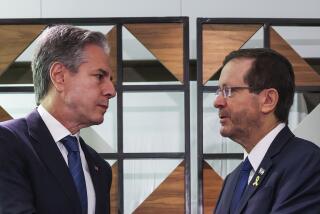Mideast leaders press Israel on peace plan
RIYADH, SAUDI ARABIA — Arab leaders urged Israel to accept a 5-year-old peace plan that they say could end the decades-old Middle East conflict, calling for negotiations with the Jewish state as the annual Arab League summit drew to a close here Thursday.
But key elements of the plan raise doubts about its chances for success. It calls for the creation of a Palestinian state and for Israel to relinquish lands captured in the 1967 Middle East War, a point Israel flatly rejected when the proposal was unveiled by Saudi Arabia in 2002.
And even as they threw their political weight behind a push for peace, the leaders gathered in the Saudi capital sniped at Israel, which is so widely loathed in the Arab world that in many countries, it does not even appear on maps.
“Whenever Arabs come up with clear, frank and transparent decisions toward peace, [Israel] rejects them,” Saudi Foreign Minister Saud al Faisal said. “This [approach] does not show a country that wants peace.”
In Israel, Vice Premier Shimon Peres said that the issues raised by the 2002 plan should be ironed out in direct talks, not set as preconditions.
“I don’t think we need to predetermine what we accept or don’t accept,” Peres told Israel Radio. “Each side should come with their own positions and negotiate from there.”
Israel has long been opposed to several of the plan’s key steps, among them a withdrawal to pre-1967 borders and the inclusion of East Jerusalem in a Palestinian state.
Israeli officials also reject the return of Palestinian refugees who lost homes in what is now Israel, arguing that the influx of so many Arabs would change the demographics of the Jewish state and destroy it from within.
But Arab leaders refused to amend the wording. Speaking to reporters after the summit, Arab League Secretary-General Amr Moussa sounded a hard-line warning to Israel.
“Israel ... wants normalization only, and nothing with it,” Moussa said. “The Arab position is that nothing is for free.”
Without responding directly to the Arab League declaration, the Israeli Foreign Ministry issued a statement saying it welcomed dialogue with Arab states. “Moderate Arab states can fill a positive role,” it said.
Despite deep reservations, Israeli Prime Minister Ehud Olmert has praised elements of the 2002 plan, saying they could form the basis for peace talks.
He did not comment on specific elements of the plan but was quoted by Israeli media late Thursday as saying the summit represented a “revolutionary change” in the Arab world’s thinking toward Israel.
“The influential Arab countries are beginning to understand that Israel is not their greatest concern,” Olmert told members of his Kadima party, according to the website of the Yediot Aharonot newspaper.
Yitzhak Reiter, a senior researcher at Hebrew University’s Truman Institute, said Israel was hoping to find a route to new peace talks in the Arab plan -- while trying to steer clear of the language in the declaration.
Speaking before the assembly of kings, presidents and other Arab leaders, Palestinian Authority President Mahmoud Abbas also warned Israel against rejecting the plan.
“We should not waste more chances in the history of this long and painful cause,” he said.
The Islamic militant group Hamas seemed leery of the plan, urging that there be no compromise on the issue of refugees.
In Washington, State Department spokesman Sean McCormack called the Arab proposal a “positive development.”
The Arabs came together against a bleak regional backdrop of mounting body counts, sectarian civil war and ossified political systems. With little leverage to alleviate the troubles, they threw their focus on the region’s classic problem: the Palestinian-Israeli conflict.
But the rising power of Shiite Muslim Iran, a historical foe to Sunni Arabs, cast a shadow on the summit.
In a thinly veiled jab at both the Iranian nuclear program and Israel’s presumed possession of atomic weapons, the declaration called for “freeing the region from weapons of mass destruction without double standards” and warned of “a dangerous and destructive nuclear arms race in the region.”
But the leaders, many of whom have announced plans to develop nuclear programs of their own in recent months, also used the summit declaration to assert their right to peacefully pursue nuclear power.
Signs of Arab strain were evident. Libyan ruler Moammar Kadafi boycotted the summit and accused the other leaders of getting their orders “from Liza,” a reference to U.S. Secretary of State Condoleezza Rice.
In a physical manifestation of a bitterly divided state, Lebanon was represented by two separate delegations. The country’s politics and administration have been in limbo for months, with the U.S.-backed government resisting demands by the Hezbollah-dominated opposition for a greater share of power.
Special correspondent El Hennawy reported from Riyadh and Times staff writer Stack from Cairo. Times staff writer Ken Ellingwood in Jerusalem contributed to this report.
More to Read
Sign up for Essential California
The most important California stories and recommendations in your inbox every morning.
You may occasionally receive promotional content from the Los Angeles Times.










